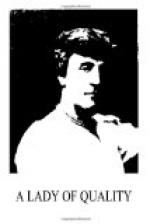Her prayers being at length ended, she had risen from her knees and sat down, taking a sacred book to read, a book of sermons such as ’twas her simple habit to pore over with entire respect and child-like faith, and being in the midst of her favourite homily, she heard the chariot’s returning wheels, and left her chair, surprised, because she had not yet begun to expect the sound.
“’Tis my sister,” she said, with a soft, sentimental smile. “Osmonde not being among the guests, she hath no pleasure in mingling with them.”
She went below to the room her ladyship usually went to first on her return at night from any gathering, and there she found her sitting as though she had dropped there in the corner of a great divan, her hands hanging clasped before her on her knee, her head hanging forward on her fallen chest, her large eyes staring into space.
“Clorinda! Clorinda!” Anne cried, running to her and kneeling at her side. “Clorinda! God have mercy! What is’t?”
Never before had her face worn such a look—’twas colourless, and so drawn and fallen in that ’twas indeed almost as if all her great beauty was gone; but the thing most awful to poor Anne was that all the new softness seemed as if it had been stamped out, and the fierce hardness had come back and was engraven in its place, mingled with a horrible despair.
“An hour ago,” she said, “I swooned. That is why I look thus. ’Tis yet another sign that I am a woman—a woman!”
“You are ill—you swooned?” cried Anne. “I must send for your physician. Have you not ordered that he be sent for yourself? If Osmonde were here, how perturbed he would be!”
“Osmonde!” said my lady. “Gerald! Is there a Gerald, Anne?”
“Sister!” cried Anne, affrighted by her strange look—“oh, sister!”
“I have seen heaven,” Clorinda said; “I have stood on the threshold and seen through the part-opened gate—and then have been dragged back to hell.”
Anne clung to her, gazing upwards at her eyes, in sheer despair.




